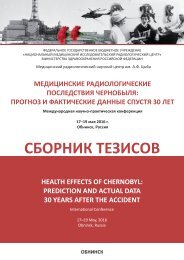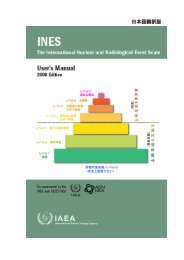Guidelines for Iodine Prophylaxis following Nuclear Accidents
Iodine_Prophylaxis_guide
Iodine_Prophylaxis_guide
Create successful ePaper yourself
Turn your PDF publications into a flip-book with our unique Google optimized e-Paper software.
<strong>Guidelines</strong> <strong>for</strong> iodine prophylaxis <strong>following</strong> nuclear accidents1999 updateexcess of stable iodine can block the transport to a certain extent.However, if the infant is administered stable iodine, it will beprotected from radioactive iodine in the milk <strong>for</strong> the next day.There<strong>for</strong>e, stable iodine prophylaxis <strong>for</strong> lactating mothers can bedecided upon by the same criteria as <strong>for</strong> other young adults, to protectthe woman herself. Repeated dosage is to be avoided.Adults under 40 yearsIn young adults, the risk of radiation induced thyroid cancer is low (14).On the other hand, the risk of serious side effects from a single dose ofstable iodine is also low. Stable iodine as a single dose can be given tothis group if intervention is decided upon. The dose criteria <strong>for</strong>intervention will in principle be significantly higher than <strong>for</strong> children. Itwill be important that contraindications (known iodine allergy, presentor past thyroid disease of any kind, dermatitis herpeti<strong>for</strong>mis, andhypocomplementaemic vasculitis) be taken into consideration.Repeated administration of stable iodine <strong>for</strong> protection againstingested radioactive iodine is not indicated in this group, as the risk ofside effects will be increased. Appropriate control of food may also beeasier <strong>for</strong> adults than <strong>for</strong> children. Adults could, <strong>for</strong> example,completely abstain from drinking milk during the contaminationperiod, without fear of nutritional effects.Adults over 40 yearsThe risk of radiation induced thyroid cancer in this group is probablyextremely low and may even be zero (14). The risk of side effectsfrom stable iodine increases with increasing age as the incidence ofthyroid diseases is higher. Stable iodine prophylaxis is not indicated<strong>for</strong> this group, unless doses to the thyroid from inhalation rise to levelsthreatening thyroid function, that is of the order of about 5 Gy. Suchradiation doses will not occur far away from an accident site(cf. section 2.2).12






